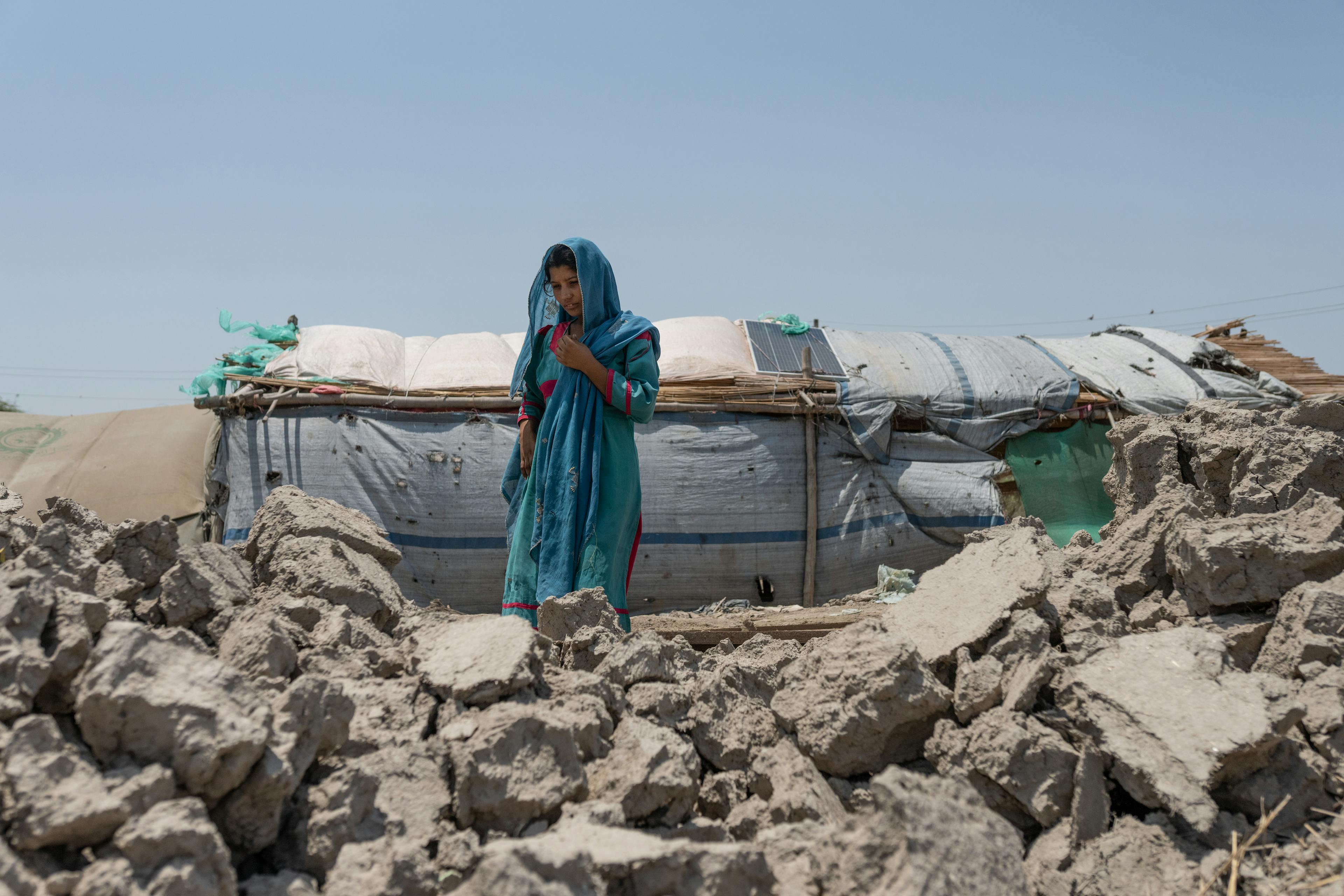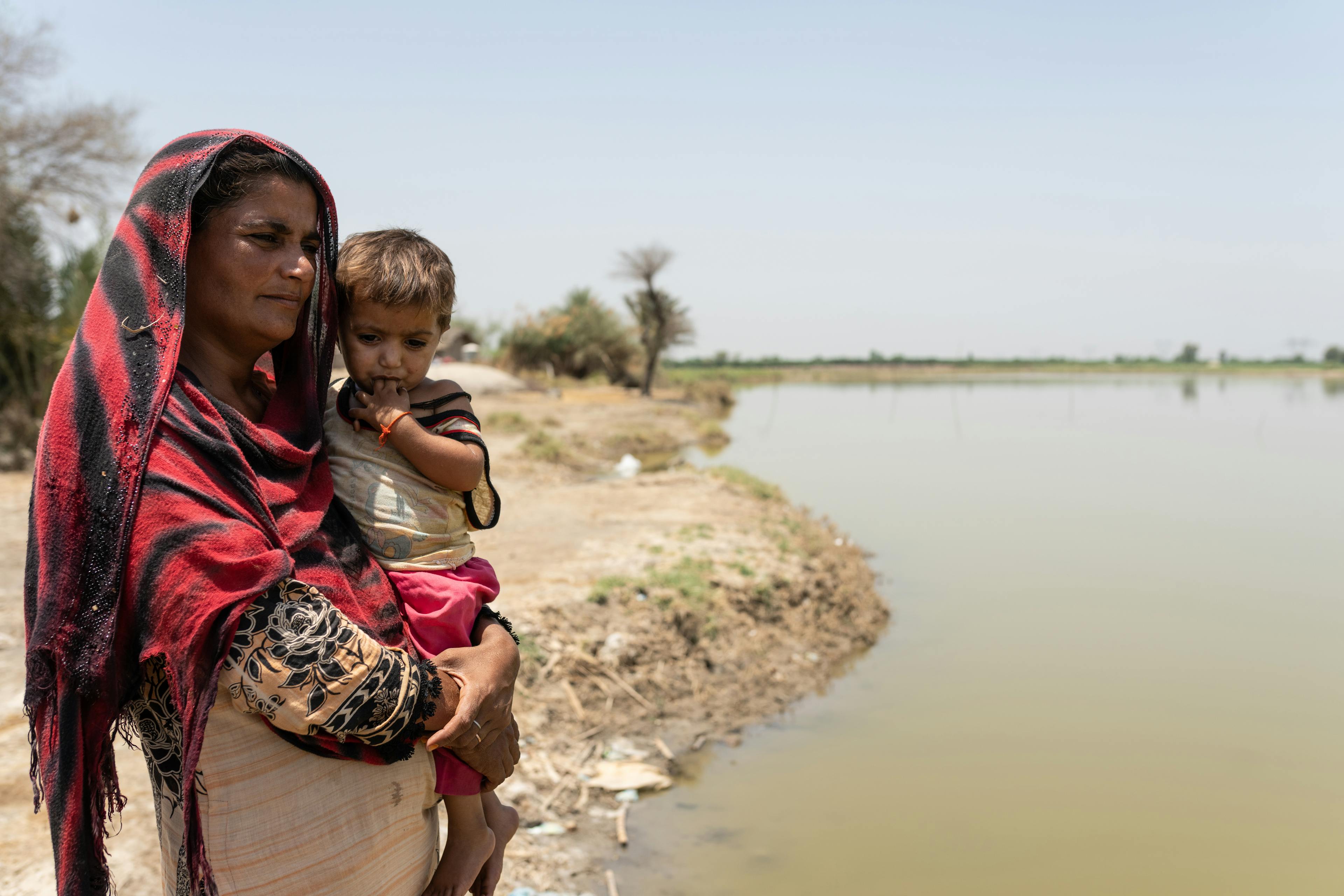
A Generation in Crisis
Home
Stories
A Generation in Crisis
The climate crisis will have a cascade of impact on the mental health of kids and their families for generations. At UNICEF our interventions to address these are multi-pronged. Technology and innovation are crucial and practical ways to address the climate crisis and it’s knock on effects - but mental and emotional support is just as important in shifting the future for kids to one that’s more hopeful.
Not just a passing trend
The interconnectedness of rising mental health issues amongst youth and the growing climate crisis is something we’ve been tracking for some time. Speak to any young person about what keeps them up at night and you’re sure to hear that the climate crisis is a major one. According to a global study published in Lancet, a staggering 70% of young people report feeling afraid for the future due to climate issues, with many experiencing high levels of anxiety.
In well-resourced countries like Aotearoa that have the means to effect positive climate strategies, we have been advocating, lobbying and advising governments on how best to safeguard children in this race against climate change.
For countries that don’t have the structural and financial resources to weather climate related storms, the effects on young people and children are being experienced in unprecedented and cumulative ways. One of them is the surge in mental health problems often brought about by displacement and loss from extreme weather events.
With 2024 Mental Health Awareness Week upon us we wanted to highlight that for rangatahi around the world, this emotional and mental burden is not just a fad, it’s indeed very real; it's a reflection of how interconnected our mental health is with our environment.

What the research says
A recent report published by UNICEF, A Threat to Progress, states that in a spate of 5 years, between 2016 and 2021, there were 43.1 million internal displacements of children linked to weather- related disasters. This is the equivalent to around 20,000 child displacements per day. 95% of these were due to floods or storms.
The potential mental health impacts of displacement on children are severe and wide-ranging given their early stage of physiological and cognitive development and reliance on adults for their well-being and security. Symptoms associated with climate related displacement include; depression, anxiety, other disorders such as post-traumatic stress disorder (PTSD) and school behavioral problems. And of course parents and caregivers experience grief, depression, anxiety, PTSD, anger, and suicidality too as a result of displacement and the grief of losing everything. This in turn can lead to increased aggression and domestic challenges for parents when caring for their children, all risk factors for child mental health and well-being.
In these parts of the world where children and families are on the frontline of climate change, we run programmes and projects to support them. Mental and psychosocial support playing a key role. These are just a few stories of kids who’s childhoods have changed because of the climate crisis, but whose sense of hope and possibility of a normal life are being restored thanks to the support of UNICEF staff and the regular contributions of committed donors.

Mozambique
Fourteen-year-old Delfio came to Namitangurine with his family last year after Cyclone Freddy. "I started dancing and doing theatre here. I had never danced before," he recalls.
The climate shocks in Mozambique, as with many parts of Africa, affect the vulnerable population. It’s a country with a 2500 km long coastline along Southeast Africa. The huge floodplain provides a large target area for natural disasters. 60% of the population lives in low-lying coastal areas and there are fifteen transboundary rivers. The sea level is rising slowly but steadily and natural disasters such as cyclones and floods are becoming more frequent because the warm air absorbs more water. Cyclones, usually associated with major flooding, also bring diseases such as cholera, malaria and dengue fever.
Every second child (0-17 years) grows up in a family living below the poverty line. Natural disasters drive families further into poverty and can also lead to uprooting. Child marriages, exploitation and child labour are the direct consequences as families struggle to make ends meet.
Since 2003, the government has been resettling people in Namitangurine who have lost their homes due to natural disasters. After Cyclone Freddy alone, 383 families fled here. UNICEF supports a child-friendly centre where kids can be registered if documents have been lost while fleeing from disasters, where victims of violence or sexual abuse can find contact persons or can search for lost family members. Around 300 children take part in the activities at the child protection centre where performances and shows are coordinated and put on for those in this community.
As part of the show, Delfio reads out a letter that he has written especially for the event. He talks about mental health and the psychosocial support the kids received. He also spoke about avoiding gender-based violence. "We have learnt a lot," he reads. "Drawing, dancing, telling our story. We have learnt how to avoid violence, that you shouldn't get married under the age of 18."
Delfio now has ambitions to become a lawyer. He wants to protect kids from gender-based violence and young girls from the scourge of child marriage and early pregnancies that he has seen happen around him. And it’s seeing these ambitions come to life that is the goal- to nurture, protect and encourage kids like Delfio and his dreams of a better life.

Ethiopia
The Borena zone is one of the severely drought-affected zones in Oromia region in the south of Ethiopia. It has an estimated population of 1.2 million with 91% of people living rural pastoral lives, whose livestock provided their livelihood. Since the region’s cumulative droughts, a large number of internally displaced people have sheltered in settlement areas and host communities like the one in Dubuluk. The cumulative droughts have been catastrophic due to the death of livestock which has devastated the economic freedom of these families. The impact of this has caused mass displacements as rural dwellers came to nearby villages in search of relief aid from Government and partners.
At the displacement camp in Dubluk, the impact of this is tangible as community members endure severe psychosocial distress. Safety and security of women and adolescent girls is at risk as people are living in over-crowded living conditions exposing girls and women to gender-based violence (GBV). Child headed households, orphaned children, child marriage and child labour are also major concerns.

UNICEF in collaboration with the government sectors and international NGOs as well as national civil societies have come together to lessen the harm this situation has caused to the lives and wellbeing of kids and women. Our initiatives include access to mental health and psychosocial support as well as case management services for gender based violence survivors. This is done through the work of social workers who we’ve helped recruit. Referral Pathways are updated and referred to hospitals with one stop centres for medical care. We’re also providing legal support and education in gender based violence awareness and prevention to the communities affected.
No child or youth should be subjected to violence and distress like this, and with ongoing support from our donors and partners, we can continue providing this care.
Pakistan
The floods that ravaged Pakistan in 2022 were part of a series of back to back climate induced disasters that hit much of South East Asia in recent years.
Noor Khatoon, was 22 when the floods hit her home in Sindh Province, Pakistan. At the time she had already experienced heartbreaking loss. The first was due to complications during pregnancy. The second was amid the devastating flooding that destroyed her home.
Just days after giving birth at home, Noor was forced to evacuate with other members of the community in a makeshift boat. But the stress took a physical as well as a mental toll. “I was barely eating during the rains and couldn’t breastfeed,” Noor says. Mothers and children take the heaviest toll during climate-related disasters.

“We were stuck at home for weeks. The rain wouldn’t stop. It felt like being in prison,” 13-year-old Sanjay says when he thinks back to the summer of the floods.
Climate change is causing distress, anger and other negative emotions in children. But for children in emergencies, education is about more than having a place to study. Schools protect children from the physical dangers around them – including abuse and exploitation. They provide children with lifesaving food, water, health care and hygiene supplies. They offer psychosocial support, giving children stability and structure to help them cope with the trauma they experience in the wake of natural disasters. And as much as anything, they are a place where children can meet with their friends, play – just be kids.
Since the 2022 floods in Pakistan, UNICEF has provided psychosocial support to over 500,000 children and caregivers as well as supported over 200,000 kids to continue their education.

‘It hurts to see children and the mothers of my country suffering. But we are going to stay here, supporting them, no matter how long and what it takes. The people of Pakistan are resilient, but we need to help them getting ready for another disaster. We know it comes. The question is when," says Zahida, Chief of the UNICEF Hyderabad field office in Pakistan.
Before, during and after
The climate crisis is changing childhood across the world. The above examples are of communities living on the front lines of this crisis. Yet even in well resourced countries like Aotearoa, the rise of climate induced mental health anxiety in rangatahi is a major concern. The term ‘eco-anxiety’ being coined to describe this phenomenon... A phrase that didn't exist 10 years ago.
At UNICEF we’re always working towards innovating and preparing for climate change. Whether it’s working with experts to come up with new predictive technologies to making sure our warehouses around the world are fully locked and loaded with life-saving supplies . And in parts of the world where we don't run programmes, like in Aotearoa, to advocate for the right of kids to live in safe environments and to amplify the voices of youth to the highest decision making level.
We cannot stop the climate crisis but with your help we can find new ways to innovate and prepare children and their communities. To ride its waves and help them build back some sense of normalcy and hope.



